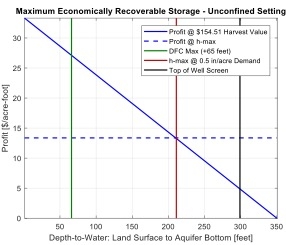Exploring Groundwater Recoverability in Texas - Maximum Economically Recoverable Storage

Justin C. Thompson, Charles W. Kreitler, Michael H. Young
Texas Water Journal, 2020, https://twj.media/exploring-groundwater-recoverability-in-texas/
Study Summary
The 2017 Texas State water plan projected total water supply deficits of 4.8 and 8.9 million acre-feet under drought-of-record conditions by the years 2020 and 2070, respectively. These deficits are driven by a combination of growing population—and demand for water—concurrent with declining available water supplies. Reductions in groundwater supply account for 95% of anticipated declines in total water supply, illustrating the importance of management approaches. Lately, some analyses have argued that restrictive groundwater management plans may be creating a regulation-induced shortage of groundwater in Texas. However, the state’s yield estimates supporting these critiques do not account for many of the physical and none of the economic constraints to groundwater recoverability. Importantly, if the cost of pumping groundwater exceeds the economic gain from using the water, those resources are effectively unavailable for many users. In this paper, we describe a new framework—called maximum economically recoverable storage (MERS)—for quantifying the feasibility of groundwater extraction using aquifer properties, pumping well characteristics, and economic constraints that identify sustainable groundwater withdrawal rates. The framework was tested for an agricultural case on the central section of the Carrizo-Wilcox Aquifer. The framework is capable of identifying the maximum capacity of the well and aquifer to meet demand and the point at which groundwater extraction costs exceed the economic activity. Our results indicate that these constraints may limit certain uses to as little as 1% of current groundwater yield estimates. We suggest that Texas groundwater managers, stakeholders, and policymakers assessing groundwater availability need an alternate approach for estimating recoverability.
Why is this research important and why do the results matter?
- Current groundwater management in Texas relies on arbitrary limits for determinig potential availability; the lack of physical or economic constraints distorts the feasibillty of actual groundwater yield.
- This new framework could provide groundwater conservation districts with a more holistic approach for assessing groundwater recoverability for its stakeholders.
- As Texas moves into the mid-21st century with higher water demand and uncertainty in terms of climate and groundwater recharge, improved water resource data will enhance the efficacy of water planning and management.